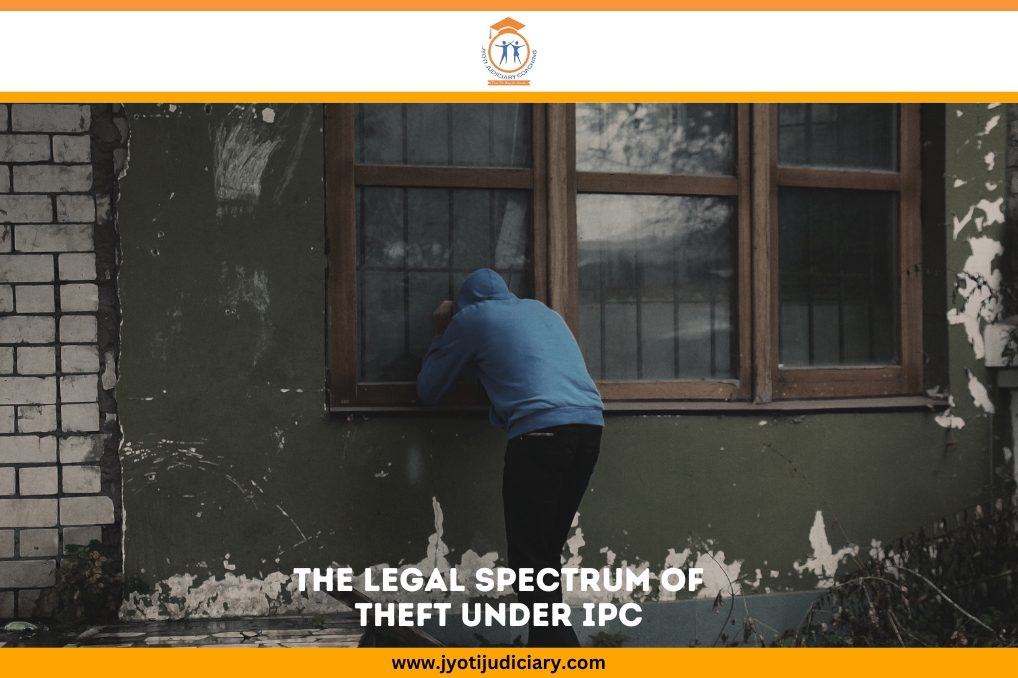
A fundamental notion in criminal law, theft constitutes one of the crimes that is tried the most frequently in the entire world. Theft is strictly defined and governed in India according to the Indian Penal Code (IPC), which represents the moral as well as legal framework of the country as a whole. In order to ensure that justice is carried out and rights are protected, both legal experts and the general public need to comprehend the intricacies of theft under the Indian Penal Code.
Theft under IPC
- According to Section 378 of the IPC, theft among other offences in ipc is defined as anybody who moves any movable item that they intend to steal dishonestly out of someone else’s possession without that person’s agreement is considered to have committed theft.
- Therefore, it can be stated that the dishonest removal of moveable goods “out of the possession of any person” without that person’s agreement is defined as theft under section 378 of the IPC.
Theft Section 378: Examples
- On Z’s property, A chopped down a tree with the goal of stealing it from Z without getting his or her permission. Here, A has already committed theft as soon as he chopped down the tree to facilitate this take.
- A encounter a bullock with a treasure chest. He steers the bullock in a particular direction so he can steal the wealth dishonestly. A has stolen the loot as soon as the bullock starts to move.
Essential Elements of Theft in IPC
- Dishonest Intention: The accused must possess a dishonest intention in order to take another person’s movable property without that person’s consent. The dishonest intention is the desire to wrongfully earn or lose something for oneself or another. When a property is taken, there must be a deliberate purpose to steal. Someone might not be charged with theft, for instance, if they retrieve a misplaced wallet with the intention of giving it back to its rightful owner but decide to keep it instead.
- Property that is Movable: The item needs to be able to be moved from one location to another. This covers both material goods like cash, jewellery, and cars as well as immaterial goods like intellectual property. For instance, it can be deemed theft if someone takes another person’s vehicle without that person’s consent.
- Ownership: For theft to be taken into consideration, the property in question must belong to someone else and the accused must not have the right to steal or hold it. It might not be theft, for example, to take one’s own automobile from a garage and not pay the bill.
- Taking Property without Permission: It is necessary to take property without the owner’s approval. Theft cannot be attributed to items taken with the owner’s permission. For instance, it might not be theft if someone borrows a friend’s laptop with permission and then forgets to give it back. It is, nevertheless, deemed larceny if the individual takes it without the owner’s permission.
- Moving the property: In order to seize the property, the accused must relocate it. Even if it might only be a small movement, it needs to be done with the goal of stealing the item dishonestly. For instance, it might be theft if someone steals a cell phone out of someone’s pocket without that person’s permission. It is not regarded as larceny, though, if the phone is inadvertently pocketed and then comes loose from there.
Theft Punishment IPC
- section 378 ipc punishment deals with punishment for theft.
- It states that any individual found guilty of stealing faces a maximum sentence of three years imprisonment of any kind, a fine, or both.
Theft Under IPC: Case Rulings
- In the case of Pyare Lal Bhargava v State of Rajasthan, it was decided that temporarily removing an item with the intention of returning it after obtaining payment is theft. This means that temporarily depriving someone else of their property and causing them to suffer unjustified loss is also considered theft.
- In the case of Uttam v Bhagwati, the court ruled that a legitimate claim to land that is being litigated in civil court is not theft.
For theft, possession is all that is necessary. If the initial step is made in an unethical manner, theft has already taken place. Stealing is a crime that requires ulterior motivations. The only items that are deemed stolen are tangible ones. Another component of the stealing offense is consent. One can give explicit or implicit consent. Any physical object transported without authorization, however, will be prosecuted as theft.
Theft under IPC FAQs
1. What is the conclusion of theft in IPC?
Any individual found guilty of theft faces a maximum sentence of three years in prison of any kind, a fine, or both.
2. What is a dishonest intention in theft?
The accused must demonstrate a dishonest intention in order to take another person’s movable property without that person’s consent. The dishonest intention is the desire to wrongfully earn or lose something for oneself or another.
3. How do you prove theft in IPC?
The prosecution must demonstrate that the accused took the property without permission from the owner, acting dishonestly in order to deprive the owner of it permanently, in order to establish theft. The accused could face theft charges under the IPC if all of these requirements are satisfied.
4. What is the concept of theft?
Theft is defined as the deliberate moving of any movable property with the intent to dishonestly remove it from someone else’s possession without that person’s agreement.
5. What are the circumstances of theft?
A dead body is not a person, hence taking movable property out of someone else’s possession without that person’s consent qualifies as theft.
6. What is theft under false pretences?
A person who intentionally misrepresents the truth in order to deceive the owner of their property into voluntarily giving it away is said to have committed theft under false pretenses.
7. Is theft a cognizable Offence?
In contrast to offenses like public annoyance, harm, and mischief, crimes like rape, murder, and theft are recognized as crimes in India. Non-cognizable offenses are often subject to the First Schedule of the Indian Penal Code (IPC) and are subject to bail.
8. Can a person be liable for theft of his own property?
One may even commit theft from their own possessions. The Indian Penal Code refers to “possession” rather than “ownership” in Section 378. Whether or not he is the property’s legitimate owner is irrelevant.
9. What is the punishment for theft?
Any individual found guilty of stealing faces a maximum sentence of three years in prison of any kind, a fine, or both.
10. What is the difference between theft and stealing?
Whereas theft deals with the actual taking of goods, theft concentrates on the intent to take. The broad taking of another person’s property is theft, whereas theft only occurs in business settings.
11. What are 3 ways to prevent theft?
- Keep valuables out of sight; including purses and wallets, cell phones, electronics, and jewellery, and never leave your valuables unattended.
- Do not carry more than you need. Keep superfluous valuables safely within your home. Only bring the bare minimum of cash or credit cards that you will require for the day.
- Don’t make any phone calls on your cell until you get to your destination. However, if you must talk on your cell phone while traveling, use headphones or a hands-free device so that you can keep your phone secure and out of sight.
12. Which coaching is best for the judiciary?
The most excellent judiciary coaching in Jaipur is provided by Jyoti Judiciary Coaching. Its goal is to create a comfortable learning environment for the pupils. It makes the difficult task appear easy, which increases the likelihood of achieving the desired outcome. The goal at Jyoti Judiciary is to give you the finest education possible. The Institute pledges to use every resource at its disposal to provide you with the finest preparation for the Judicial Service entrance examinations.
13. Which coaching is best for RJS preparation?
“Jyoti Judiciary Coaching” is a reputable coaching program in Jaipur that helps prepare students for the RJS exam. The finest online and offline RJS coaching program in Jaipur, Jyoti Judiciary, enables a methodical approach to preparing for the RJS examination. Their curriculum has been carefully designed to cover all the subjects and courses needed to pass the Rajasthan Judicial Services Exams.
Read to know: Chargesheet in CRPC
With the goal of giving students the best coaching available for law entrance exams including the CLAT, AILET, and various other numerous state judiciary exams, Jyoti Judiciary Coaching, India’s Finest educational Platform, was established. Come enroll now with Jyoti Judiciary!
For any latest news, legal topics, judiciary exams notifications, patterns, etc watch Jyoti Judiciary’s YouTube channel for legal videos for any updates at https://youtube.com/@jyotijudiciarycoaching4852?si=2cwubh9d2A9urwJf










